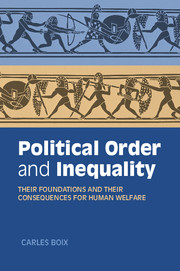Introduction
Published online by Cambridge University Press: 05 March 2015
Summary
Human life is unfeasible in the absence of some minimal political order. Without stable rules governing their social interactions, men and women live under a condition, at best, of generalized mistrust and, more often, of exploitation and open war. Deploying and pursuing any consistent and rational life plan becomes impossible to them. Freedom of action and a sphere of private life cannot exist. Innovation, investment, and growth do not take place.
And yet, despite the fundamental advantages that flow from having a stable social and political order, securing it is neither automatic nor cost free. The creation and maintenance of a set of either formal or informal rules to sustain cooperation in a given human community require the deliberate efforts and actions of its members. Because the final structure of political authority may have different consequences on the welfare of different people, political order may not take place at all: under certain circumstances some or all individuals may prefer to plunder others instead of subjecting themselves to some shared rules of behavior and to a common authority. When it happens, the internal configuration of political order responds to the economic and military capabilities of the actors that established it – shaping the political and social status as well as the wealth and life chances of everyone.
- Type
- Chapter
- Information
- Political Order and InequalityTheir Foundations and their Consequences for Human Welfare, pp. 1 - 21Publisher: Cambridge University PressPrint publication year: 2015

